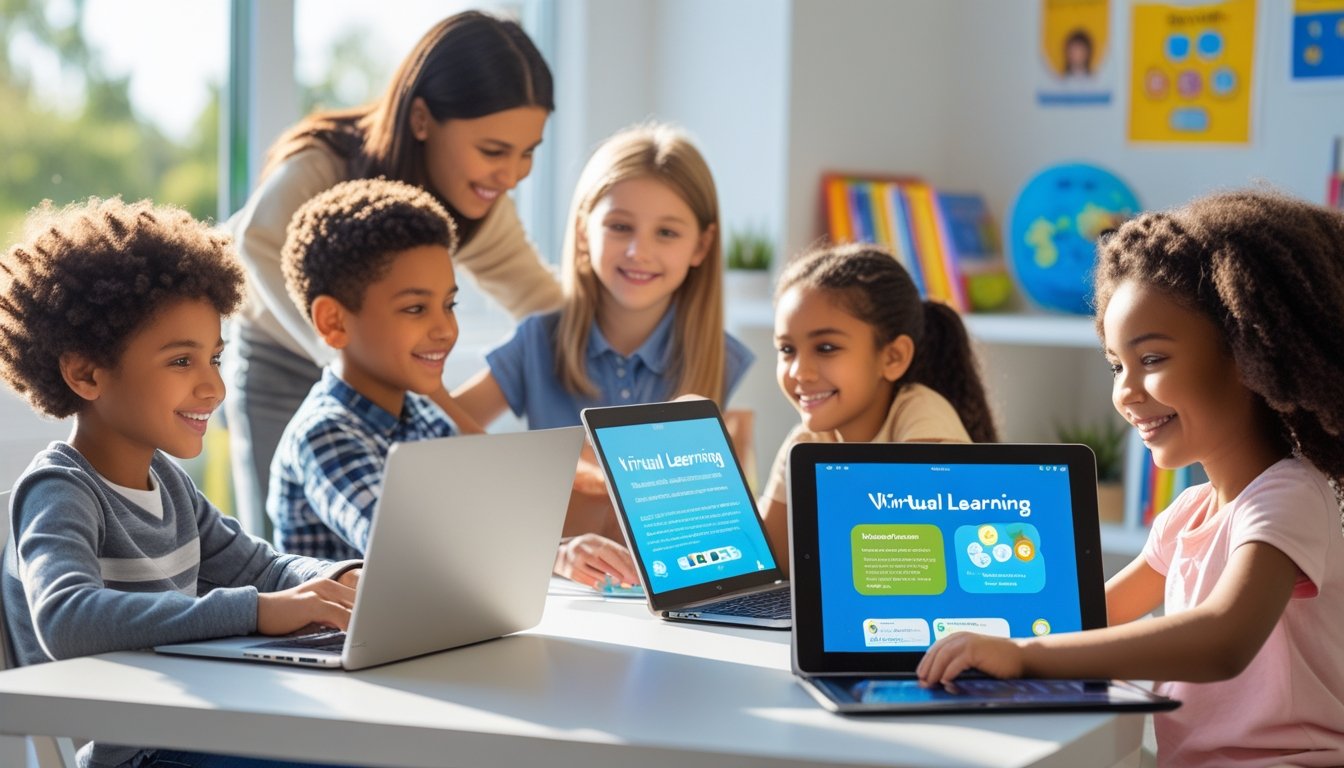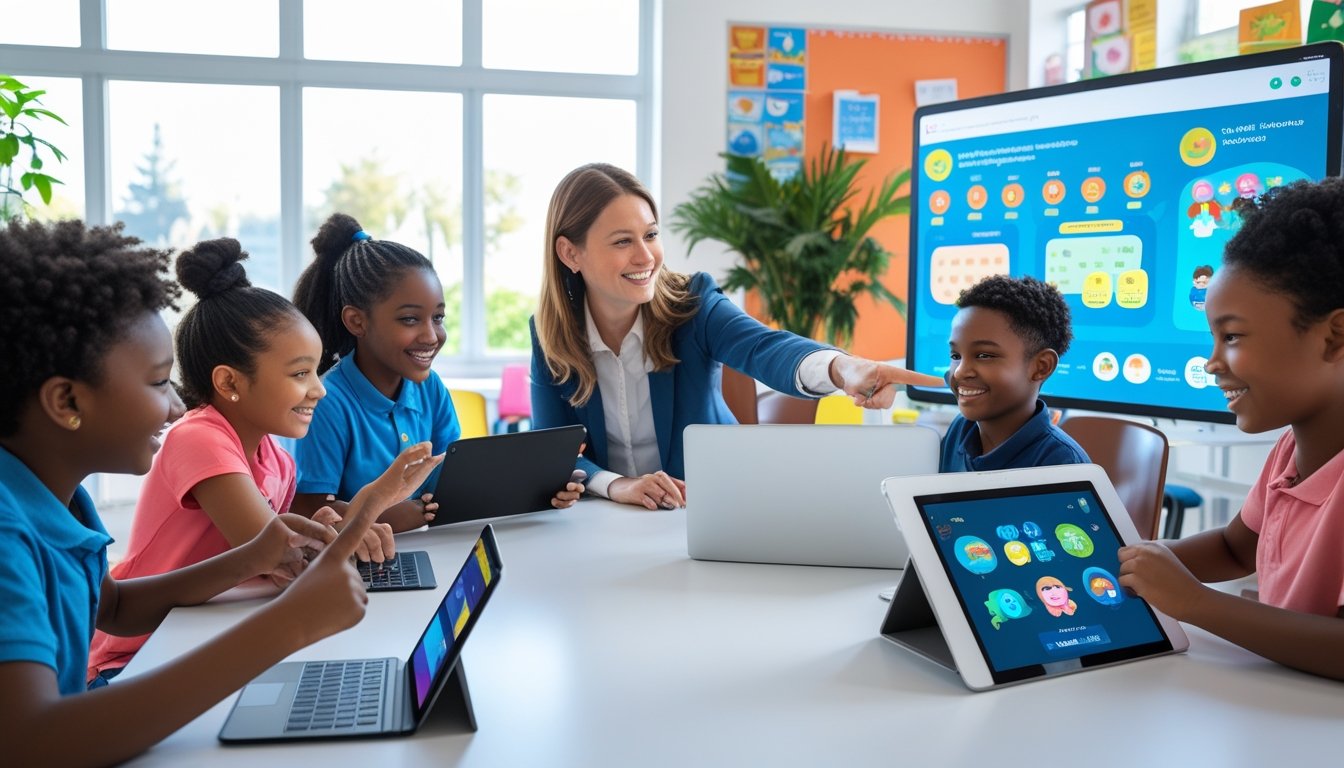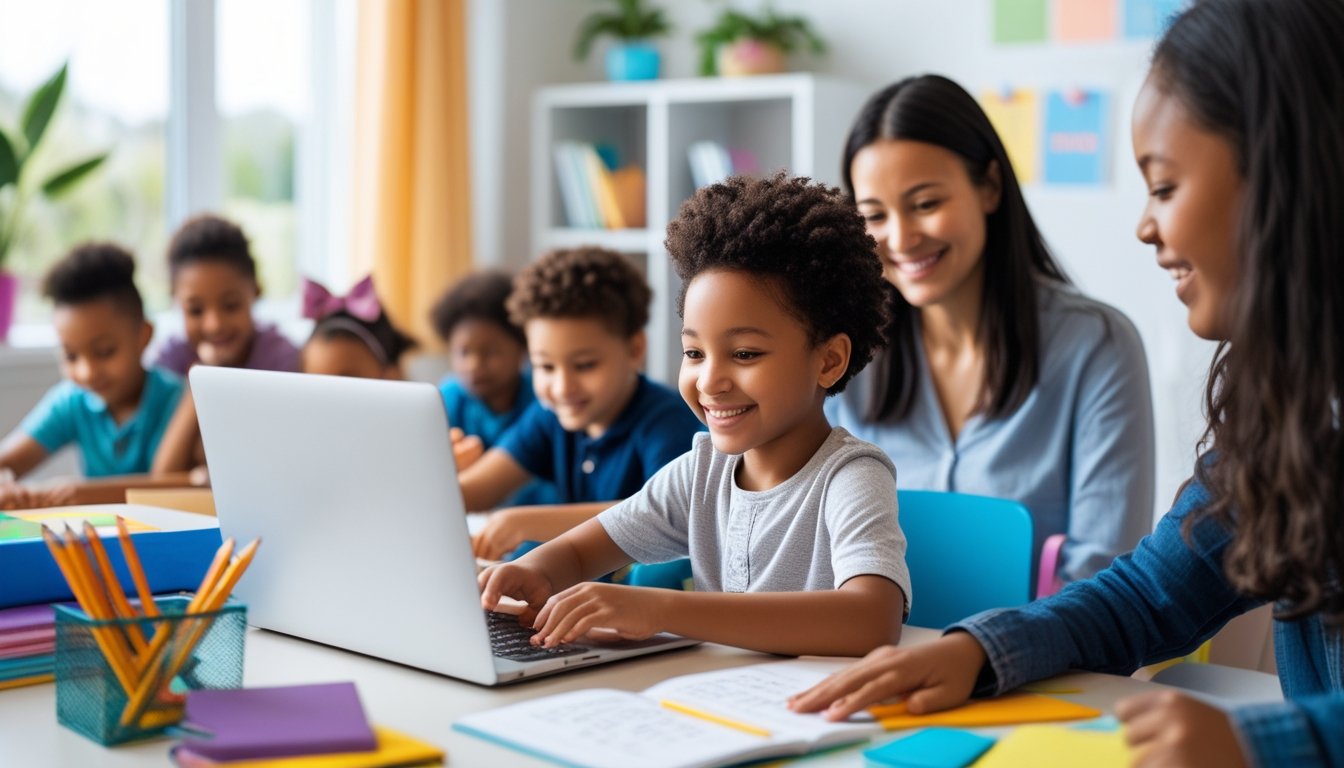Late updated: 07 Sep 2025 08:09
Written by:
Benefits Of Virtual Learning For Children: Enhancing Education In The Digital Age
The digital age has transformed how we approach learning, particularly for children. Virtual learning has opened doors to vast educational resources, allowing children to experience education in ways previously unimaginable. These platforms not only foster a personalised learning environment but also promote engagement by integrating interactive digital tools. With virtual classes, children who might be shy or face social anxiety can participate comfortably in discussions, contributing far more than they might in traditional settings.

By embracing technology, we enable children to learn at their own pace, explore subjects that interest them deeply, and access a world of knowledge from their own homes. Interactive elements such as videos, quizzes, and forums give life to the learning process, making it more dynamic and accessible. This not only boosts self-confidence but also encourages children to become active participants in their educational journey.
Key Takeaways
- Virtual learning offers personalised and flexible educational experiences.
- Digital tools enhance children's engagement and confidence.
- Shy children benefit from comfortable participation environments.
Key Benefits Of Virtual Learning For Children
Virtual learning offers various advantages, notably in flexibility, personalised education, and knowledge retention. These aspects contribute significantly to enhancing children's educational experiences through adaptable and engaging learning environments.
Increased Flexibility And Accessibility
We recognise the significant advantage of virtual learning in providing flexibility. Children can learn from any location, removing geographical barriers that traditional schooling may impose. This is especially advantageous for families with irregular schedules as they can tailor education to fit personal needs.
Accessibility is another cornerstone. With devices connected to the internet, educational resources are at our fingertips. This can transform learning into a more inclusive experience, breaking down barriers that physical classrooms may not overcome. Amid a pandemic or other disruptions, distance learning ensures education continuity, minimising gaps in a child's academic journey.
Personalised Learning Experiences
Virtual learning platforms allow for customisation based on individual learning paces and preferences. This tailoring means children aren't pressured to conform to one-size-fits-all teaching methods. Instead, learning becomes a more individualised experience.
Adaptive learning technologies in e-learning systems adjust accordingly, offering challenges appropriate to each child's level. This can foster a love for learning, as students engage with material that resonates with their abilities. When children receive coursework aligned with their personal interests and strengths, it can lead to deeper engagement and superior learning outcomes.
Faster Feedback And Improved Knowledge Retention
Our experience with virtual learning reveals that the speed at which feedback is given can be significantly faster. Immediate feedback through online quizzes and assessments helps children understand their mistakes and learn from them promptly.
Improved retention rates are another benefit, as various interactive tools such as videos, animations, and quizzes are utilised. These methods tap into different learning styles, helping to reinforce the knowledge acquired. By engaging students on multiple levels, virtual learning environments tend to leave a lasting impression, aiding in the retention of critical information for future use.
Enhanced Engagement And Development Through Digital Tools

Digital tools can significantly enhance learning experiences for children by fostering engagement and supporting their development. By leveraging interactive activities, cultivating social skills, and preparing children for the digital future, these tools create a more dynamic and immersive learning environment.
Interactive Activities: Quizzes And Games
Interactive activities like quizzes and games are essential in engaging children in virtual learning environments. These tools capture children’s attention and help retain information by providing challenges and instant feedback.
Quizzes can assess understanding and pinpoint areas for improvement. Learning platforms frequently offer customisable quizzes that adapt to the learner's pace. Games, on the other hand, introduce a sense of play into education. By employing game mechanics such as points, levels, and rewards, children remain motivated and keen to learn more.
Studies suggest that incorporating these elements in online learning not only enhances cognitive abilities but also improves problem-solving skills. As children navigate these digital landscapes, they practice decision-making and learn to think critically, thus aligning their learning process with modern educational methods.
Building Social Skills And Peer Connections
Virtual learning offers unique opportunities to develop social skills. Online environments foster interpersonal relationships and collaboration through interactive features like chat groups, forums, and video calls. This facilitates experiences where children can interact with peers, share ideas, and work collectively towards goals.
Digital platforms may simulate classroom-like settings, enabling children to experience teamwork through group projects and shared digital activities. These interactions enhance communication skills and empathy, allowing children to appreciate diverse perspectives and cultures.
Moreover, children often organise and engage in peer-to-peer teaching, where they learn by instructing others, which reinforces understanding and nurtures leadership qualities. As a community, we can encourage these experiences to maximise their social and emotional development.
Preparation For The Digital Future
Emphasising digital literacy is crucial in preparing children for future challenges in a technology-driven world. Today's educational tools equip children with essential skills such as coding, navigating digital platforms, and understanding internet safety. Using digital resources, children can research, analyse, and create in ways traditional methods cannot replicate.
These tools teach adaptability by introducing rapidly changing technologies and innovative learning methods. Exposure to virtual learning environments prepares children for real-world applications, bridging the gap from theoretical knowledge to practical skill application.
As technology continues to evolve, so must our approach to education, ensuring children are well-equipped to thrive in an interconnected digital landscape. By embracing digital tools, we nurture a generation ready to face future innovations confidently.
Frequently Asked Questions

Our exploration of virtual learning delves into its direct impact on children's educational journeys, touching upon its adaptability, skill enhancement, and collaborative opportunities.
What are the proven advantages of virtual classes for younger students?
Virtual learning offers younger students the chance to engage in adaptive learning experiences. It's an effective way to cater to individual needs, providing customised content that can foster a student's curiosity and enhance comprehension.
How does online learning enhance a child's educational experience?
Online learning enriches the educational experience by broadening access to diverse resources and interactive content. Students are able to explore subjects at their own pace, which can help in cultivating a deeper understanding of the material.
What are the long-term benefits of engaging in online education for children?
Engaging in online education equips children with digital literacy skills that are indispensable in today's world. By navigating virtual platforms, children develop critical thinking and self-discipline, setting a robust foundation for future academic and professional success.
In what ways does virtual learning contribute to a child's skill development?
Virtual learning encourages the development of a broad range of skills. It facilitates cognitive skills through problem-solving activities and enhances digital communication skills by using various online applications and tools for interaction.
How does the flexibility of online classes positively impact a child's learning journey?
The flexibility afforded by online classes allows children to balance their learning with other activities. This adaptability enables students to complete assignments at times that are most conducive to their concentration and energy levels.
Can virtual learning environments improve collaboration and social skills in children?
Yes, virtual learning environments can foster collaboration through group assignments and interactive discussion forums. These platforms offer opportunities for social interaction and teamwork, helping children to build essential communication and collaboration skills even in a remote setting.
